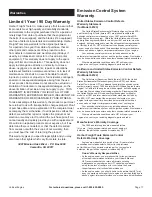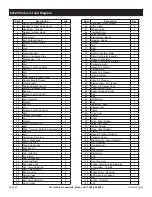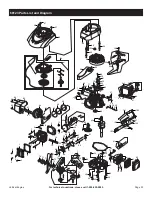
Page 9
For technical questions, please call 1-800-520-0882.
Vertical Engine
Operation
Read the ENTIRE IMPORTANT SAFETY
INFORMATION section at the beginning
of this manual including all text
under subheadings therein before
set up or use of this product.
Pre-Start Checks
Inspect engine and equipment looking for
damaged, loose, and missing parts before set
up and starting. If any problems are found, do
not use equipment until fixed properly.
Checking and Filling Engine Oil
CAUTION!
Your Warranty is VOID if the engine’s
crankcase is not properly filled with oil before
each use. Before each use, check the oil level.
Do not run the engine with low or no engine
oil. Running the engine with no or low engine
oil WILL permanently damage the engine.
1. Make sure the engine is stopped and is level.
2. Clean the top of the Dipstick and the area around it.
Remove the Dipstick by threading it counterclockwise,
and wipe it off with a clean lint free rag.
3.
Full level
Reinsert the Dipstick without threading it in and
remove it to check the oil level. The oil level should
be up to the full level, the top of the crosshatched
area on the dipstick as shown above.
4. If the oil level is below the full level add the
appropriate type of oil until the oil level is at the
correct level. SAE 10W-30 oil is recommended
for general use. (The
SAE Viscosity Grade chart
on page 13
in the
Service
section shows other
viscosities to use in different average temperatures.)
5. Thread the Dipstick back in clockwise.
CAUTION!
Do not run the engine with too little
oil. The engine will be permanently damaged.
Checking and Filling Fuel
WARNING!
TO PREVENT SERIOUS
INJURY FROM FIRE:
Fill the fuel tank in a well-ventilated area away
from ignition sources. If the engine is hot from
use, shut the engine off and wait for it to cool
before adding fuel. Do not smoke.
1. Clean the Fuel Cap and the area around it.
2. Unscrew and remove the Fuel Cap.
3. If needed, fill the Fuel Tank to about 1 inch
under the fill neck of the Fuel Tank with 87
octane or higher unleaded gasoline.
Note: Do not use gasoline containing more than
10% ethanol (E10). Do not use E85 ethanol.
Note: Do not use gasoline that has been stored in
a metal fuel container or a dirty fuel container. It
can cause particles to enter the carburetor, effecting
engine performance and/or causing damage.
4. Then replace the Fuel Cap.
5. Wipe up any spilled fuel and allow excess to evaporate
before starting engine. To prevent FIRE, do not start
the engine while the smell of fuel hangs in the air.
Starting the Engine
Before Starting the Engine
Before starting the engine:
a.
Follow the Set Up Instructions
in the equipment manual to
prepare the equipment.
b.
Inspect the equipment and engine.
c.
Fill the engine with the proper amount
and type of both fuel and oil.
d.
Read the Equipment Operation
section in the equipment manual.










































